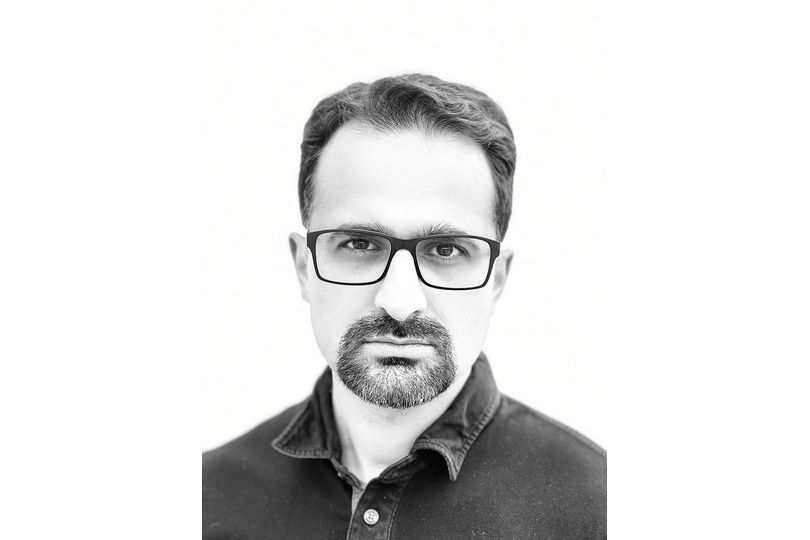Interview With Amit Majumdar, Author of "The Map & The Scissors"
on Jul 18, 2022

Amit Majmudar is the author of five critically acclaimed novels, four collections of award-winning
poetry, a translation of the Bhagavad Gita with commentary, as well as a forthcoming memoir and a three-volume retelling of the Mahabharata. The former first Poet Laureate of Ohio as well as a diagnostic and nuclear radiologist, he lives in Westerville, Ohio, with his wife and three children.
Frontlist: What made you think that the two characters, Jinnah and Gandhi, are the ideal rival for each other? Who do you believe can be regarded as their counterparts in the modern era?
Amit: Jinnah pursued the division of British India along religious lines. Gandhi once compared dividing India into India and Pakistan to cutting his own heart. Gandhi’s philosophy insisted that India’s peoples were all Indians in spite of differing religions, while Jinnah’s “two nations theory” insisted that Hindus and Muslims were separate nations and must have separate countries. This fundamentally opposite way of looking at people, groups, and British’s India’s post-Independence future made them rivals. Then, once you factor in their appearance and personalities—penurious Gandhi dressed as a “half-naked fakir” in Churchill’s phrase, and very religious; rich Jinnah, not particularly observant, and always in well-tailored suits—the contrast is tailor-made for a novelist. The two men have no counterparts in the modern-day because politicians don’t quite come larger-than-life like that anymore.
Frontlist: A lot of your emphasis is on the partition. What would be the outcome if the two nations were not divided, to begin with? Do you think there could be a possibility in the future of both the nations reuniting?
Amit: The two nations will never reunite in the lifetime of anyone reading this (or ever, in my opinion). The outcome, if the two nations were never divided at all, is a matter of speculation. I believe that secessionist movements would have broken out, probably along religious lines, with local civil wars of varying intensity and duration. Some might have been put down, others might have resulted in smaller ethnostates or mini-Pakistans. “Balkanization” might have been more likely. The creation of two large nation-states made sure that each could define itself against the other, that is, experience rivalry and distrust of the other. Shared antagonism has a unifying effect.
Frontlist: What do you think would have happened if both characters switched roles? Do you think the outcome would have been deferred?
Amit: The two characters could not have switched roles. Their approaches to the problem of an independent India were fundamental expressions of their natures.
Frontlist: Both Jinnah & Gandhi have their separate meaning & dream of freedom. On a personal level, who do you align yourself more with?
Amit: I give both rivals their due. I believe Gandhi was an idealist whose vision could not have lasted if implemented. Jinnah was also an idealist whose vision, Pakistan, broke into Pakistan and Bangladesh just a quarter century after its realization. So I don’t align myself with either. Personally, I believe both were wrong; I also believe there was no "right" answer to the central political conundrum of that era. People mistakenly think of these things in that binary: what was the right thing to do, what was the wrong thing to do. Sometimes, there is no correct course of action, only a less-incorrect course of action; and because you can only run one experiment once, you literally never know whether you picked the least-incorrect action. As the Gita says: gahana karmano gatih. The way of action is profoundly murky.
Frontlist: A radiologist specialising in nuclear medicine & an author/poet. How do the two fields resonate with you? Was the passion for always writing within you?
Amit: I have had a passion for writing since about the age of eleven or so. As for radiology, the two fields are mostly separate in my mind. I do not write about radiology very much, though if anyone is interested in seeing some of my writing on that subject, it can be read here: https://granta.com/the-doctor-will-see-you-now/
Frontlist: What is one belief/argument that you believe both characters would have agreed on during their lifetime?
Amit: That the British Empire should leave the Indian subcontinent. Both characters wanted that outcome, but they differed on what the map should look like once that happened.

.jpg)
.jpg)
.jpg)
.jpg)
.jpg)
.jpg)

.jpg)
.jpg)
.jpg)
.jpg)

.jpg)
.jpg)
.jpg)
.jpg)










Sorry! No comment found for this post.